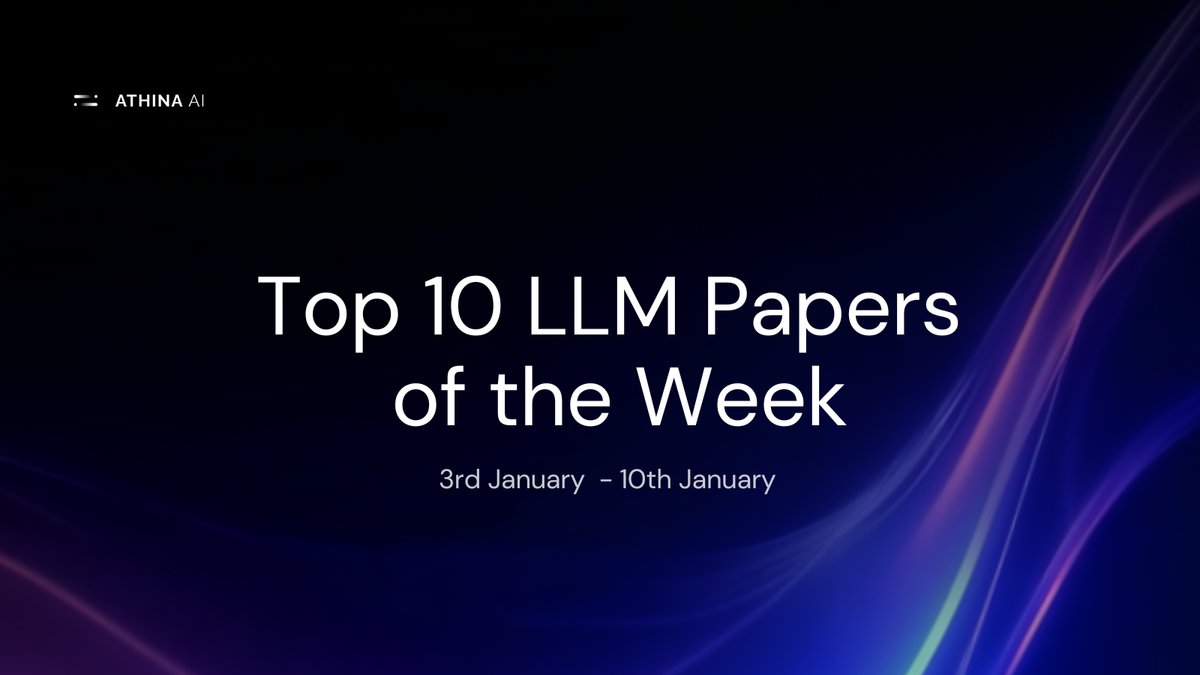Top 10 LLM Papers of the Week: 3 Jan - 10 Jan

As we move into the second week of the New Year, the excitement in Artificial Intelligence remains electrifying, with Large Language Models (LLMs) continuing to dominate the forefront of innovation. This week, another wave of groundbreaking research has emerged, further expanding the horizons of what LLMs can achieve and tackling critical challenges in their advancement. In this article, we explore 10 Cutting-Edge Research Papers from the Second Week of the Year — breaking down their insights, examining their implications, and understanding their significance in shaping the future of AI.
1) MTRAG: A Multi-Turn Conversational Benchmark for Evaluating Retrieval-Augmented Generation Systems
MTRAG is a benchmark for evaluating LLMs on multi-turn retrieval-augmented generation (RAG) conversations, featuring 110 human-generated conversations across four domains. It highlights challenges like handling unanswerable and non-standalone questions, showing that even advanced systems underperform.
Why it Matters:
MTRAG exposes key limitations in RAG systems and offers a pathway to improve conversational AI for real-world applications.
2) Semantic Captioning: Benchmark Dataset and Graph-Aware Few-Shot In-Context Learning for SQL2Text
This paper addresses the underexplored task of semantic captioning, converting SQL queries into natural language (SQL2Text), to enhance code understanding and security. It repurposes Text2SQL datasets with iterative prompts and emphasizes efficient in-context learning (ICL) for smaller LLMs. Experiments show that leveraging SQL’s graph properties for sample selection boosts BLEU scores by up to 39%, outperforming random and alternative methods.
Why it Matters:
SQL2Text improves the interpretability of SQL queries, critical for secure and accessible code usage, especially as LLMs become central to coding and educational platforms.
3) Evaluation of the Code Generation Capabilities of ChatGPT 4: A Comparative Analysis in 19 Programming Languages
This paper introduces PRMBench, a benchmark for evaluating Process-level Reward Models (PRMs) on fine-grained error detection in reasoning tasks. PRMBench includes 6,216 problems and 83,456 step-level labels, assessing models on simplicity, soundness, and sensitivity. Testing 15 models reveals significant weaknesses in current PRMs, emphasizing challenges in process-level evaluation.
Why it Matters:
PRMBench addresses critical gaps in PRM evaluation, providing a foundation to improve reasoning accuracy in tasks requiring step-by-step validation.
4) Tougher Text, Smarter Models: Raising the Bar for Adversarial Defence Benchmarks
This paper introduces a comprehensive benchmark for evaluating adversarial defences in NLP, covering diverse datasets, tasks, and defence mechanisms. It assesses critical tasks like classification, similarity detection, and reasoning, setting a new standard for adversarial robustness evaluation.
Why it Matters:
The benchmark provides a unified framework to advance adversarial robustness, fostering more reliable and secure NLP systems.
5) Can LLMs Design Good Questions Based on Context?
This paper evaluates questions generated by LLMs from context, comparing them to human-generated questions across six dimensions. We introduce an automated LLM-based evaluation method, focusing on aspects like question length, type, context coverage, and answerability. Our findings highlight unique characteristics of LLM-generated questions, contributing insights that can support further research in question quality and downstream applications.
Why it Matters:
The insights can improve question generation quality, enhancing applications in education, search, and AI research.
6) Agent Laboratory: Using LLM Agents as Research Assistants
Agent Laboratory is an autonomous LLM-based framework designed to streamline the research process by handling literature review, experimentation, and report writing based on user-provided ideas. Evaluations show it generates state-of-the-art results, reduces research costs by 84%, and benefits significantly from human input. Platforms like Agent Laboratory, and tools such as Athina AI, which accelerates AI development and deployment for teams, are reshaping the way researchers and developers innovate in the AI domain.
Why it Matters: By automating labor-intensive aspects of research, Agent Laboratory empowers researchers to focus on creative ideation, potentially accelerating scientific discovery and innovation across disciplines.
7) Towards Reliable Testing for Multiple Information Retrieval System Comparisons
This paper evaluates statistical methods for multiple comparisons in Information Retrieval (IR), where comparing more than two systems can inflate error rates. Using simulated and TREC data, it finds that Wilcoxon combined with Benjamini-Hochberg correction maintains error rates within significance levels and offers the best statistical power.
Why it Matters:
The findings improve reliability in IR system evaluations, ensuring robust statistical practices in real-world, multi-system comparisons.
8) Re-ranking the Context for Multimodal Retrieval Augmented Generation (RAG)
This paper improves the retrieval phase of multi-modal retrieval-augmented generation (RAG) by using an advanced relevancy score (RS) to select more relevant entries from the knowledge base. Adaptive selection of up-to-k entries eliminates irrelevant context, enhancing response accuracy in evaluations with the COCO dataset.
Why it Matters:
Optimizing multi-modal RAG retrieval reduces errors and hallucinations, advancing the reliability of systems integrating diverse data types like text and images.
9) Towards System 2 Reasoning in LLMs: Learning How to Think With Meta Chain-of-Thought
Meta Chain-of-Thought (Meta-CoT) extends traditional CoT by explicitly modeling the reasoning processes behind it. The framework incorporates process supervision, synthetic data, and search algorithms, supported by instruction tuning and reinforcement learning. It offers a roadmap for training LLMs to produce Meta-CoTs, enabling more advanced reasoning.
Why it Matters:
Meta-CoT fosters human-like reasoning in AI, unlocking potential for robust and transparent decision-making across complex tasks.
10) Multi-task retriever fine-tuning for domain-specific and efficient RAG
This work addresses practical challenges in Retrieval-Augmented Generation (RAG) by instruction fine-tuning a single small retriever encoder for multiple domain-specific tasks. This approach ensures scalability, low cost, and high speed while generalizing well to out-of-domain and unseen retrieval tasks in real-world enterprise use cases.
Why it Matters:
A unified retriever encoder simplifies deployment and improves efficiency, making RAG applications more scalable and cost-effective for diverse real-world scenarios.
Conclusion
As we progress through the second week of the year, these featured papers showcase remarkable advancements and ongoing challenges in the evolution of AI technology. From enhancing security and efficiency to broadening applications in software engineering, medical reasoning, and ethical decision-making, this research marks notable progress in the field.
Simultaneously, it underscores the importance of responsible development and innovation to ensure AI's meaningful and ethical integration into our lives.
For insights from the Top 10 Papers from the Last Two Weeks, click here
Looking for a platform to streamline your AI development? Check out Athina AI, a platform designed for your team to build, test and monitor AI Features.



